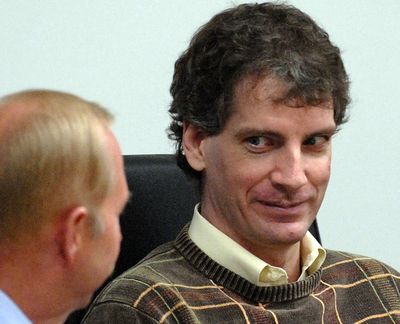Duncan may face other trials
California DA vows to prosecute killer

BOISE – As a federal jury decides whether Joseph Duncan lives or dies for his murder and torture of a 9-year-old boy, the killer’s legal saga may have only just begun.
In addition to his pending sentence on 10 federal counts relating to his abduction of Dylan and Shasta Groene and Dylan’s murder, Duncan faces a first-degree murder charge in connection with the 1997 kidnapping and murder of 10-year-old Anthony Martinez in Southern California. The Riverside County, Calif., district attorney’s office charged him with the Beaumont, Calif., boy’s death in January 2007. District Attorney Rob Pacheco has said he’ll seek the death penalty.
“We have to wait our turn in line,” said Ingrid Wyatt, spokeswoman for the district attorney’s office. But she’s confident it will come.
“He will be returned here to Riverside County to face those charges,” she said. “The family has waited for more than 10 years to bring this man to justice.”
A fingerprint obtained after Duncan’s July 2, 2005, arrest matched a partial print taken from duct tape used to bind the boy, who was playing outside his home with friends in April 1997 when a man drove up in a white car and asked for help finding his cat. The man forced Anthony into the car at knifepoint. The boy’s body was found 15 days later. The sketch of the suspect shows an eerie resemblance to Duncan.
But how quickly could Duncan be sent to the Riverside County Jail to face trial, if ever? Should the federal jury opt for a life sentence instead of death, Duncan will return to Kootenai County and face the death sentence for the three first-degree murder convictions in the bludgeoning deaths of Dylan and Shasta’s 13-year-old brother, Slade, their mother, Brenda, and her fiance, Mark McKenzie. He pleaded guilty to the three first-degree murder charges and three first-degree kidnapping charges in October 2006.
But if the Boise jury imposes the death sentence, Duncan will get a fixed life sentence for the murders and the state’s case will be over. If no appeals are filed in the federal case, Riverside County could seek to extradite Duncan immediately. It’s unclear how state and federal prosecutors would respond. Authorities close to the Duncan case can’t comment because of a gag order issued by U.S District Judge Edward Lodge.
David Leroy, a Boise lawyer and former state attorney general, said the California request may not be as controversial as it could appear.
“I think you’d probably see more cooperation instead of less cooperation,” Leroy said. “Generally speaking, there is common courtesy extended to jurisdictions on those types of issues.”
Or, he said, there might be no request.
“It may be if the death penalty is imposed here that the prosecutor down there would have second thoughts about spending as much money and time and resources as they need” to convict, Leroy said. “I’m telling you it will be seriously revisited and revised.”
But Wyatt is adamant her office won’t back down.
“It’s not a waste of money when the death of a child is involved,” she said. “It was a shocking crime involving the abduction and murder of a 10-year-old boy. For a family to endure that for more than 10 years now, it’s certainly been difficult. Certainly they want justice, and certainly we’re going to seek it here.”
After Duncan was named the prime suspect, a group that included Anthony’s third-grade teacher traveled to Coeur d’Alene to thank the Denny’s waitress who spotted Shasta with Duncan.
Though Duncan has been linked to the 1996 slayings of two young half-sisters in Seattle, his only other outstanding charge is the molestation charge he was facing in Minnesota when he set out on what he described in court Friday as “a rampage” to kidnap, sexually abuse and kill.
“You people really don’t have any clue yet of the true heinousness of what I’ve done,” he told the jury Friday during his closing argument. “My intention was to kidnap and rape and kill until I was killed, preferring death, easily, over capture.”
Minutes after Duncan’s arrest, Shasta told a Coeur d’Alene police officer Duncan had said he’d killed children before and never been caught, as heard in the dashcam recording of the interview played in court.
Authorities took the claim seriously. Internet bloggers studied unsolved child murders looking for links to Duncan and quickly homed in on the Anthony Martinez case. Police in Oak Harbor, Wash., once thought he may have been responsible for the 1997 killing of a 10-year-old girl, but Police Chief Rick Wallace said Friday they ruled him out a couple months ago based on findings by FBI agents and investigators in the Groene case.
There’s been speculation that encrypted files on a laptop computer found in Duncan’s stolen Jeep could hold clues to past crimes, but, as outlined in testimony last week, the government can’t crack the password.
Duncan wrote on his blog in the weeks before the Groene murders that he kept a detailed journal that, once authorities figured out how to access, would reveal much more about him.
He offered to give up that password in a proposed plea to the state charges that would have kept the state death penalty off the table, but the state turned it down.